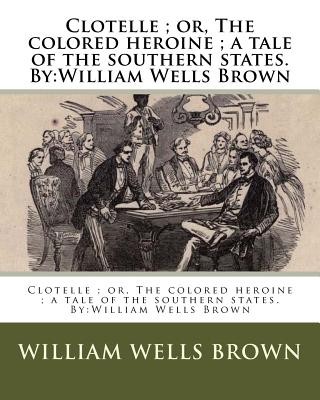
- We will send in 10–14 business days.
- Author: William Wells Brown
- Publisher: CreateSpace Independent Publishing Platform
- Year: 2016
- Pages: 80
- ISBN-10: 1537072013
- ISBN-13: 9781537072012
- Format: 20.3 x 25.4 x 0.4 cm, minkšti viršeliai
- Language: English
- SAVE -10% with code: EXTRA
Clotelle; or, The colored heroine; a tale of the southern states. By (e-book) (used book) | bookbook.eu
Reviews
Description
William Wells Brown (circa 1814 - November 6, 1884) was a prominent African-American abolitionist lecturer, novelist, playwright, and historian in the United States. Born into slavery in Montgomery County, Kentucky, near the town of Mount Sterling, Brown escaped to Ohio in 1834 at the age of 20. He settled in Boston, where he worked for abolitionist causes and became a prolific writer. His novel Clotel (1853), considered the first novel written by an African American, was published in London, where he resided at the time; it was later published in the United States. Brown was a pioneer in several different literary genres, including travel writing, fiction, and drama. In 1858 he became the first published African-American playwright, and often read from this work on the lecture circuit. Following the Civil War, in 1867 he published what is considered the first history of African Americans in the Revolutionary War. He was among the first writers inducted to the Kentucky Writers Hall of Fame. A public school was named for him in Lexington, Kentucky. Brown was lecturing in England when the 1850 Fugitive Slave Law was passed in the US; as its provisions increased the risk of capture and re-enslavement, he stayed overseas for several years. He traveled throughout Europe. After his freedom was purchased in 1854 by a British couple, he and his two daughters returned to the US, where he rejoined the abolitionist lecture circuit in the North. A contemporary of Frederick Douglass, Wells Brown was overshadowed by the charismatic orator and the two feuded publicl
- Author: William Wells Brown
- Publisher: CreateSpace Independent Publishing Platform
- Year: 2016
- Pages: 80
- ISBN-10: 1537072013
- ISBN-13: 9781537072012
- Format: 20.3 x 25.4 x 0.4 cm, minkšti viršeliai
- Language: English English
William Wells Brown (circa 1814 - November 6, 1884) was a prominent African-American abolitionist lecturer, novelist, playwright, and historian in the United States. Born into slavery in Montgomery County, Kentucky, near the town of Mount Sterling, Brown escaped to Ohio in 1834 at the age of 20. He settled in Boston, where he worked for abolitionist causes and became a prolific writer. His novel Clotel (1853), considered the first novel written by an African American, was published in London, where he resided at the time; it was later published in the United States. Brown was a pioneer in several different literary genres, including travel writing, fiction, and drama. In 1858 he became the first published African-American playwright, and often read from this work on the lecture circuit. Following the Civil War, in 1867 he published what is considered the first history of African Americans in the Revolutionary War. He was among the first writers inducted to the Kentucky Writers Hall of Fame. A public school was named for him in Lexington, Kentucky. Brown was lecturing in England when the 1850 Fugitive Slave Law was passed in the US; as its provisions increased the risk of capture and re-enslavement, he stayed overseas for several years. He traveled throughout Europe. After his freedom was purchased in 1854 by a British couple, he and his two daughters returned to the US, where he rejoined the abolitionist lecture circuit in the North. A contemporary of Frederick Douglass, Wells Brown was overshadowed by the charismatic orator and the two feuded publicl


Reviews